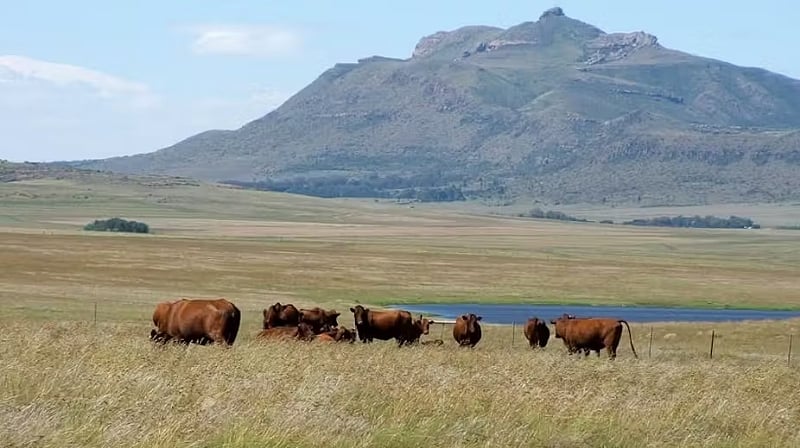South Africa’s rangelands have always had great value for the country. These areas offer more than just grazing for livestock. They provide services like purifying water, storing carbon and conserving biodiversity.
The grassland biome (28%), along with the savanna (32.5%) and the Nama-Karoo (19.5%), are collectively referred to as rangelands. They make up almost 80% of the land area of South Africa.
Their ecological services haven’t always been fully appreciated. Research into rangelands has evolved in response to environmental changes, human needs and scientific discoveries.
Commercial livestock production was the main concern when academics, researchers and practitioners met for the first congress of the Grassland Society of Southern Africa in 1966. Less than 15% of South Africa’s land surface area is arable. The only agricultural production possible on the balance of the land is livestock production from natural rangeland. Livestock production is thus a cornerstone of agriculture and food production in South Africa.
Six decades on, the Grassland Society has reflected – through a special issue of its journal, the African Journal of Range and Forage Science – on how it has tackled research challenges and adapted to shifting perceptions of rangelands.
Research has explored aspects of global change, bush encroachment and other changes in rangeland composition and function. Land transformation is another research area. Peri-urban sprawl, open-cast mining, timber plantations and other developments reduce and fragment rangeland. The result is increased pressure on the remaining, intact rangelands.
Widening scope
A review of research over the 60 years shows that early efforts focused mainly on forage production to support livestock industries. Research topics included rotational grazing and burning, as well as reinforcing rangelands by adding nutrients, forage grasses and legumes.
By the 1980s, it became clear that rangelands offered more than just grazing – they were vital ecosystems.
In the early 1990s, around the onset of democracy in South Africa, local researchers became part of global conversations around rangeland ecology. In doing so, they started to use the international terminology, instead of the old Dutch-derived word “veld”.
This shift was not just about geography, but about scope. Rangelands were increasingly seen as multifaceted ecosystems critical in the fight against climate change. Increasing temperatures, increasing atmospheric carbon dioxide levels and changing rainfall patterns pose a threat to all ecosystems. Understanding the response of rangelands is increasingly important in devising management strategies to adapt to these changes.
Scientists expanded their attention to preserving soil health, restoring degraded landscapes, and maintaining biodiversity. Issues like overgrazing, soil erosion and invasive species gained recognition in southern Africa. Degradation of rangelands in South Africa was first highlighted in the mid 1700s, and became a “mainstream” issue in the 1930s. Replacing a diverse group of wild animals with a single species of grazer, such as cattle, is the reason generally given for degradation. Fire has also been linked to it (often unfairly).
The Grassland Society responded by promoting ideas like adaptive grazing management (making decisions in response to conditions, rather than following a recipe approach). It also encouraged integrating indigenous knowledge with scientific research to create more sustainable and resilient land-use systems. This has helped shape land management practices across the region.
Many southern African rangelands face the challenge of balancing grazing with biodiversity conservation. Research on conservation agriculture and integrating livestock and wildlife systems is helping farmers and conservationists to find common ground. Wildlife, both in the conservation and the game production contexts, plays a critical role in South Africa’s economy. Tourism is one of the major contributors.
Land management is particularly important in the Mediterranean-climate regions of South Africa, where poor crop farming practices have damaged soil health. The research is guiding the development of more sustainable farming systems focused on soil regeneration and biodiversity.
A key indicator of ecosystem degradation is a decline in grassland forbs (herbaceous plants that are not grasses). They are highly sensitive to grazing pressure. So the role of wildflowers in ecosystem health and animal wellbeing has also become an important research area.
Climate change, fire suppression and overgrazing drive woody plant encroachment, where grasslands are turning into shrublands. This calls for integrated management approaches that consider fire, grazing and even controlled rewilding.
Fire is a natural element in many grassland ecosystems, and research has helped advance understanding of how it can be monitored and controlled to reduce risks while promoting healthy rangelands.
People and grasslands
Rangeland management has important social dimensions. Research is addressing issues such as land tenure, governance, community management systems on communal rangelands and indigenous knowledge in management decisions. These topics are essential for creating sustainable solutions that account for people’s livelihoods and needs.
In addition to these ecological, social and management advances, the Grassland Society of Southern Africa has worked to develop the next generation of rangeland scientists and practitioners. Through its congresses, workshops and journal publications, the society continues to foster dialogue across disciplines and communities. Its 60th congress will be held in July 2025.
Kevin Kirkman receives funding from the National Research Foundation.
Helga van der Merwe receives funding from the National Research Foundation.
Craig Morris does not work for, consult, own shares in or receive funding from any company or organisation that would benefit from this article, and has disclosed no relevant affiliations beyond their academic appointment.
By Kevin Kirkman, Professor of Grassland Science, University of KwaZulu-Natal And
Craig Morris, Senior Researcher, Agricultural Research Council – Animal Production, University of KwaZulu-Natal And
Helga van der Merwe, Doctor in Arid Systems Ecology, South African Environmental Observation Network (SAEON)


